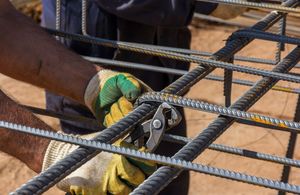News story
In a change to its interim conclusions, the TRA proposes that measures on imports of Rebar steel from China be kept

- In a change to its interim conclusions, the UK’s Trade Remedies Authority proposes that measures on imports of High Fatigue Performance Steel Concrete Reinforcement Bars from China be kept.
- Although the TRA’s initial findings in its Statement of Essential Facts indicated that keeping the measure could result in supply issues for HFP Rebar, the TRA has considered import data and economic forecasts which have become available since the publication of the SEF, and responses to the SEF received from case participants, and now proposes to change its recommendation.
The Trade Remedies Authority plans to recommend that existing measures that have been in place since 2016 on imports of High Fatigue Performance Steel Concrete Reinforcement Bars (HFP Rebar) from China be extended. A summary of its reasons for this decision has been shared on the public file.
HFP Rebar, also known as reinforcement steel and reinforcing steel, is typically used in the construction industry to reinforce concrete and masonry structures to strengthen and hold the concrete in tension. The predominant use of HFP Rebar is in construction, which employs an estimated 1.4 to 2.2 million employees and is worth over £108 billion to the UK economy.
Investigation findings
As part of its transition review into anti-dumping measures on HFP Rebar, the TRA conducted an Economic Interest Test which considered a range of factors, including the impact of maintaining or revoking the measure on UK producers and consumers. The TRA’s investigation analysis indicated that falling imports from Russia and Belarus could cause significant issues to the supply chain and have a damaging effect on the UK’s construction industry. Therefore the TRA concluded that extending the measure would not be in the overall economic interest of the UK.
Following publication of its interim findings, the TRA considered additional submissions from case parties and new import data. This indicated that the falling levels of imports from Russia and Belarus were being compensated for by rising imports from other countries. In addition, forecasts for the UK economy have declined since the SEF analysis was conducted so the TRA expect demand from the UK construction industry to grow less rapidly. Taking this additional data into account, the TRA now recommends extending the measure on HFP Rebar imports.
Following today’s publication, interested parties can comment via the Trade Remedies Service website before 14 October 2022. The TRA will then produce a Final Recommendation, which will be sent to the Secretary of State for International Trade, who will make the final decision on whether to uphold the TRA’s recommendation.
Background information
Read more about how an EIT is conducted.
-
The Trade Remedies Authority (TRA) is the independent UK body, established in June 2021, as the first non-departmental public body of the Department for International Trade, that investigates whether trade remedy measures are needed to counter unfair import practices and unforeseen surges of imports.
- Trade remedy investigations were carried out by the EU Commission on the UK’s behalf until the UK left the EU. Forty-four EU trade remedy measures of interest to UK producers were carried across into UK law when the UK left the EU and the TRA is currently reviewing each one to assess whether it is suitable for UK needs.
- Anti-dumping duties allow a country or union to take action against goods sold at less than their normal value, which is defined as the price for ‘like goods’ sold in the exporter’s home market.
- The European Commission imposed anti-dumping duties on imports of HFP Rebar from China in July 2016. This is the measure that the TRA is currently reviewing. The Commission allowed the EU measure to expire on 29 July 2021 without review.
- Read more about the TRA’s mission in its Business Plan.
Published 30 September 2022
Follow this news feed: HM Government





